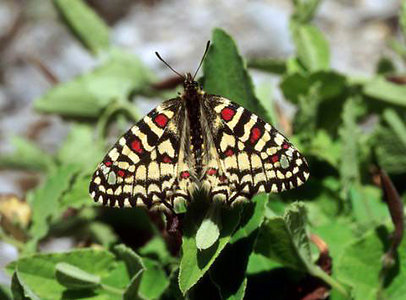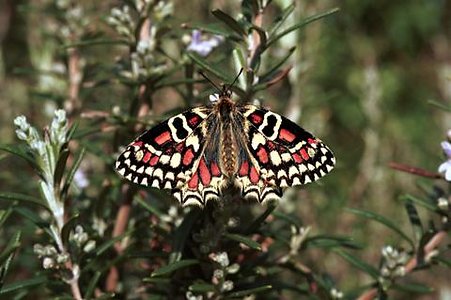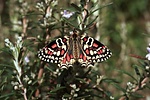Zerynthia rumina
Vazrick Nazari and Frédéric CarbonellIntroduction
The life stages of Z. rumina are discussed by Nardelli (1993; European Z. rumina) as well as Tarrier et al. (1994) and Binagot and Lartigue (1998) (African subspecies africana and tarrieri). Genitalia have been illustrated by Higgins (1975). For the classification of Spanish populations, see Sabariego and Martinez (1991). An extremely rare form, f. honnorati (Type locality: Digne, France) (reconstructed above), although often considered extinct since a hundred years ago, is still protected by law in France (Collins and Morris, 1985; Bernardi, 1991). The last official observation was 1991.
Geographical Distribution
Z. rumina is distributed from southeast France (Italy border) to Spain, Portugal, Morocco, Algeria and Tunisia (Higgins and Riley, 1970).
Geographical Variation
The nominal subspecies, Z. rumina rumina (Type locality: S. Europe)(= Z. r. lusitanica Bryk, 1932; Type localty: Portugal) is distributed in southern Spain and Portugal (Higgins and Riley, 1970). In addition to Z. r. medesicaste (Hoffmannsegg, 1803)(= Z. r. australis Esper, 1780; Type locality: ca. Nimes, S. France), other European subspecies are confined to Spain (Sabariego and Martinez, 1991); these include Z. r. castiliana Rühl, 1892 (Type locality: Castilia: S. Ildelfonso, Albarracin, Spain), Z. r. petheri Romei, 1927 (Type locality: Sierra Nevada and Malaga, Spain); Z. r. catalonica De Sagarra, 1930 (Type locality: Catalonia, Spain), Z. r. cantabricae Gomez-Bustillo, 1971 (Type locality: Puerto de Pozazal, Spain), Z. r. isabelae Sabariego and Huertas, 1976 (Type locality: Huelva prov., Spain), and Z. r. transcastiliana Sabariego, 1977 (Type locality: Spain). Most of these subspecies, however, are morphologically very similar and demonstrate great local variation, and of these maybe only 3 or 4 can be considered valid subspecies (Carbonell, unpublished). The majority of the African populations belong to Z. r. africana (Stichel, 1907) (Type locality: Algeria, Morocco) (= Z. r. mauretanica Schultz, 1908; Type locality: north Africa) (Tennent, 1996), although the (morphologically very similar) populations from Anti-Atlas Mountains in north Africa have been described as Z. r. tarrieri Binagot and Lartigue, 1998 (Type locality: Morocco) (Binagot and Lartigue, 1998).
Larval Food Plant
The larvae feed on Aristolochia pallida, A. baetica, A. longa, A. fontanesi, A. rotunda, and A. pistolochia (Bryk, 1934; Ackery, 1975; Acquier, 1981; Olivares Villegas et al., 1991; Tennent, 1996; Binagot and Lartigue 1998). A. clematitis, recorded by Bryk (1934) as a larval food plant for Zerynthia rumina, is very toxic and larvae die quickly upon feeding on it (Carbonell, personal observation).
References
Ackery, P.R., 1975. A guide to the genera and species of Parnassiinae (Lepidoptera: Papilionidae). Bull. Br. Mus. Nat. Hist. Ent. 31: 71-105, plates 1-15.
Acquier, J.C., 1981. Ponte de Zerynthia polyxena et Zerynthia rumina en captivité. Bulletin de la Societe Sciences Nat 32: 20.
Bernardi, G., 1999. Le gene "honnorati" de Zerynthia rumina (L.) a-t-il disparu? (Lepidoptera, Papilionidae). Bull. Soc. Ent. Fr. 104: 419-422.
Binagot, J.F., Lartigue, D., 1998. Une nouvelle entité subspécifique de Zerynthia rumina (Linné, 1758) dans le sud-ouest marocain (Lepidoptera Papilionidae). Linneana Belgica 16: 323-334.
Bryk, F., 1934. Baroniidae, Teinopalpidae, Parnassiidae, Part.I. Das Tierreich, Deutschen Zoologische Gesellschaft im Auftrag der Preussischen Akademie der Wissensch. Berlin und Lepizig, 64: I-XXIII, 1-131.
Collins, N.M., Morris, M.G., 1985. Threatened Swallowtail Butterflies of the World: The IUCN Red data book. Gland, Switzerland. 401 pp.
Higgins, L.G., 1975. The Classification of European Butterflies. London, Collins, 320 pp.
Higgins, L.G., Riley, N.D., 1970. A Field Guide to the Butterflies of Britain and Europe. Boston: Houghton Mifflin, 380 pp.
Nardelli, U., 1993. Bemerkungen zur Zucht einiger Zerynthiini und Parnassiini (Lepidoptera: Papilionidae). Entomologische Zeitschrift 103: 213-228.
Olivares Villegas, J., Jimenez Gomez, J.L., Yañez, J., 1991. Variations saisonnières de Zerynthia rumina Linné dans le sud de l’Espagne (Lepidoptera: Papilionidae). Linneana Belgica 13: 51-61.
Sabariego, E., Martinez, J., 1991. Bionomía y distribución geográphica de Zerynthia rumina (Linnaeus, 1758) en España. Boletín de Sanidad Vegetal, Plagas 17: 465-476.
Tarrier, M., Arahou, M., Leestmans, R., 1994. Décoverte de Zerynthia rumina (Linné, 1758) dans l’Anti-Atlas subsaharien marocain et contribution à une meilleure connaissance de l’espèce en Afrique du Nord (Lepidoptera: Papilionidae). Linneana Belgica 14: 427-438.
Tennent, J., 1996. The butterflies of Morocco, Algeria and Tunisia. Wallingford: Tennent and Gem Publishing Company, 252 pp., 52 color paltes.
About This Page
Vazrick Nazari

Canadian National Collection of Insects, Arachnids and Nematodes, Ottawa, Canada
Correspondence regarding this page should be directed to Vazrick Nazari at and Frédéric Carbonell at
Page copyright © 2006 Vazrick Nazari and
 Page: Tree of Life
Zerynthia rumina .
Authored by
Vazrick Nazari and Frédéric Carbonell.
The TEXT of this page is licensed under the
Creative Commons Attribution License - Version 3.0. Note that images and other media
featured on this page are each governed by their own license, and they may or may not be available
for reuse. Click on an image or a media link to access the media data window, which provides the
relevant licensing information. For the general terms and conditions of ToL material reuse and
redistribution, please see the Tree of Life Copyright
Policies.
Page: Tree of Life
Zerynthia rumina .
Authored by
Vazrick Nazari and Frédéric Carbonell.
The TEXT of this page is licensed under the
Creative Commons Attribution License - Version 3.0. Note that images and other media
featured on this page are each governed by their own license, and they may or may not be available
for reuse. Click on an image or a media link to access the media data window, which provides the
relevant licensing information. For the general terms and conditions of ToL material reuse and
redistribution, please see the Tree of Life Copyright
Policies.
- First online 07 July 2006
- Content changed 11 July 2006
Citing this page:
Nazari, Vazrick and Frédéric Carbonell. 2006. Zerynthia rumina . Version 11 July 2006 (under construction). http://tolweb.org/Zerynthia_rumina/65414/2006.07.11 in The Tree of Life Web Project, http://tolweb.org/











 Go to quick links
Go to quick search
Go to navigation for this section of the ToL site
Go to detailed links for the ToL site
Go to quick links
Go to quick search
Go to navigation for this section of the ToL site
Go to detailed links for the ToL site